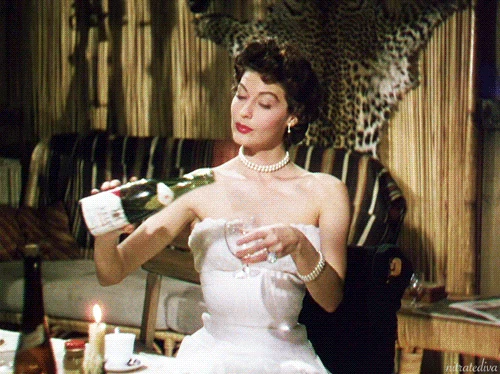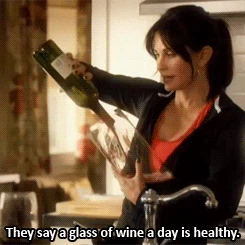Dear Women, Please Stop Drinking Wine. It's Impacting Your Fertility And Making You Depressed
Don’t shoot the messenger. Just check the research facts.

When you google “wine o’clock girls gifs” or “it’s 5:00 somewhere,” you’re not short of multiple entertaining options. Everyone knows that the girlies love their wine, just like the guys love their beer. The trophy wife’s classic home accessories are her wine goblets, and it seems that every chic Hollywood actress drinks wine at some point on the screen, whether she’s happy or depressed.

Now, some of you might, upon reading the title, spring to the defense of that historically classic liquid that has seen the rise and fall of nations and kingdoms, of great rulers and tyrants alike. This content is not meant to criticize all wine-centered cultures or insult anyone who partakes in a glass of red every evening over dinner. Wine culture is about as prevalent as coffee culture and has created a similar mentality of loyal (or defensive) attachment. But just like the scenario of enlightening our beaus about the concerns around drinking beer, there are some things to bring to light about wine. “Dry January” didn’t become such a widespread practice for nothing.
Wine Culture Then and Now
It’s strongly speculated that wine first originated in the Middle East. Archeologists estimate that the original wine was discovered approximately 6,000 BC, in the region of South Caucasus, now known as the country of Georgia, which is considered the “cradle of wine.” It was here that the early inhabitants realized that grape juice could turn into wine after being buried underground to preserve for the winter. Since grapes contain naturally occurring sugar, yeast, and acids that support fermentation, wine was an organic product of a spontaneous process. Essentially, the original wine was just fermented grape juice.
Wine became extremely popular and widely used in societies for thousands of years. As winemaker Robert Mondavi said, “If you go back to the Greeks and Romans, they talk about all three – wine, food, and art – as a way of enhancing life.” It was even distributed among the traveling troops of the Roman Empire because there would be less risk of bacterial infection and sickness from drinking wine than local water (bacteria can’t survive in wine like they can in water due to the acid content).
But in the modern era, people don’t drink wine because it’s safer than water. We drink it socially, to relax, to enjoy the taste, or as a crutch for the stresses of life. We now have “Wine Down Wednesdays” and “wine aunts” and “wine moms.” Plenty of kids associate wine with their mother, just like they do beer with their dad. But there can definitely be and has been an abuse of the 5 o’clock glass of wine, and the “mommy wine culture” was exacerbated by the pandemic.

Of course, everything in moderation, and this isn’t to say you shouldn’t enjoy the social glass here and there. However, the allowed serving that’s considered “in moderation” is 5 ounces per day, but most people never bother to measure. A continual consumption of wine, just like any other alcohol, can lead to a toxic dependency and growing attachment. Moreover, regularly consuming any type of alcohol presents risks for numerous health concerns, such as liver disease and cancers, but more on that later.
Hidden Ingredients
Unfortunately, wine isn’t just plain fermented grape juice anymore. There are multiple additives mixed in to preserve the quality of different vintages. The added ingredients also help build texture and enhance existing flavors. This is where the tasting aromas and savors come from. But how does commercial wine stay good long-term?
Wine and alcoholic beverages are not usually regulated by the FDA, but by the Alcohol & Drug Association, so wine producers are actually not required to list additional ingredients on the label beside the main substance (the wine itself) and the alcohol percentage and volume. Just because wine bottles don’t list ingredients apart from the wine title, it doesn’t mean there aren’t added ingredients however.
Although alcohol is a natural preservative in itself, most wine producers do add preservatives and inorganic sulfites to prevent oxidation and bacterial deterioration during the mass production process with long-distance shipping and long-term storage. These added preservatives include calcium carbonate, powdered tannins, potassium sorbate and metabisulfite, and sulfur dioxide. Oh, and yes, wine has added sugar and often grape juice concentrate, plus added yeast, which feeds on the sugar to kickstart the fermentation process.
Even if you go the organic route and don’t add preservatives like sulfur and synthetic sulfites, you still usually have to add other fruit, extracts or spices, yeast, juice concentrate, and hops. However, these different additives can negatively impact our health in multiple ways.
Wine & Organ Health
You might’ve heard something like “red wine improves cholesterol levels.” However, your liver and kidneys have to work harder to filter out toxins like alcohol, be it wine or spirits. The body can’t store alcohol, so it has to metabolize it immediately, which stresses the liver, the main filter organ. Alcohol causes a change in kidney function as well and makes them less able to filter the blood.

Wine is no fountain of youth. The skin is the mirror for the liver, so if the liver is stressed with filtering added toxins like alcohol, then the skin is the tattletale. Alcohol can accelerate the aging process by reducing collagen production, which can produce early wrinkles and a loss of skin elasticity. If any alcohol makes you age faster and taxes your skin, this means all alcohol does so – including wine. Voilà, myth debunked: Wine does not help you age more gracefully. A bit here and there isn’t a concern, especially if you eat well and follow a healthy lifestyle, but the 5 p.m. wine o’clock mentality won’t keep you “well preserved.”
Wine & Your Blood
Wine can make your blood sugar drop, which is why diabetics or those with prediabetes should not drink. Even if you’re not diabetic, this lowering of the blood sugar is one of the reasons why your system handles wine better with food instead of drinking on an empty stomach, which can quickly make you feel dizzy and sick.
Large amounts of wine can also spike your blood pressure. Remember, anything over 5 oz. is considered overconsumption. The hypertension caused by heightened blood pressure can damage your arteries and reproductive organs, possibly leading to fertility problems.
Wine & Your Fertility
Any form of alcohol consumption has been found to negatively affect fertility, in both males and females. Alcohol has been shown to disrupt hormone levels, including lowering progesterone, which messes with your natural cycle and its support of ovulation and successful conception. Wine also raises cortisol levels in the body and increases stress levels, which can greatly impact your feminine fertility.
Additionally, some wines are made with hops, which is a plant-derived ingredient used to brew craft beers and ales (it’s what gives the bitter taste). Just as with beer, hops contain phytoestrogens, and phytoestrogens are directly related to decreased fertility. Hops also creates conception issues because the phytoestrogens can inhibit the ovulatory process, and without proper ovulation, you can’t achieve fertilization and conception.
So, wine is not just love juice but can actually be counterproductive if you’re using it as an aphrodisiac to make a baby. A serving of wine here and there can be fine during the first two weeks of your cycle, especially in your early follicular phase, but getting closer to your ovulation and past it into the luteal phase, you’ll want to abstain from wine as well as other alcohol if you’re trying to conceive.

Wine & Inflammation
Alcohol encourages fungal and bacterial overgrowth. In addition to its alcohol content, wine also contains sugar and yeast, which makes it a favorite friend of parasitic infections or Candida infections. This is because parasites, fungi, yeasts, and bacteria all feed off sugar and yeast.
As does any other alcohol, wine also can worsen gut problems and digestive issues, including colitis, Crohn’s disease, and IBS symptoms. Alcohol irritates cells in the stomach lining and creates inflammation. Studies show that chronic alcohol intake leads to intestinal inflammation and increased permeability of the intestinal lining (a.k.a. leaky gut or ulcers). That inflammation can lead to organ damage with the consistent irritation of the organ cells.
Wine itself is naturally acidic, and those high amounts of acid can wear away at your stomach lining and cause discomfort and pain (gastritis). Those with sensitive stomachs or any type of digestive/intestinal issues should stay away from alcohol, including wine.
Wine & Your Emotional Response
Depending on the intake levels and use, alcohol can be a stimulant as well as a depressant or sedative. Initially, wine might lead to nervous stimulation, but afterward, especially with larger amounts, it can depress your system and serve as a sedative.
Wine does indeed “loosen the tongue.” Just like any other alcohol, wine breaks down your emotional response filter and makes you less calculated and mindful of your words and reactions, which is why that open bar at a wedding reception can easily turn not-so-classy, however nicely you’re dressed!
As do other alcohols, wine can make some people more emotional and even cry more easily. Depending on their weight and alcohol tolerance and intake, some people can become irritable and sharp-tongued, while others might grow full-on angry and aggressive. This can become problematic and lead to toxic habits that affect others around them. Those who struggle with their temper and anger management issues should avoid alcohol, or at least avoid frequent alcohol intake (including wine).
Although some may say “wine helps you sleep,” or “it helps me ‘wine’ down,” it’s a bad idea to depend on wine or any alcohol to help you sleep or even just relax. For sleeping and relaxation, try natural sleep aids such as chamomile tea, herbal passionflower, and magnesium or Moon Juice Magnesi-Om powder (mixed in water) to sleep well and deeply. This routine is much better for your nervous system and organ health and is a healthier inducement of quality slumber.
Wine & Your Mental Health
Wine can also exacerbate mental health struggles such as depression, anxiety, and negative feelings. Alcohol depresses the central nervous system and slows down mental functioning and clarity. Chronic drinking can raise cortisol (the stress hormone) in the body, making stress worse. Although wine may relax some, it can actually induce mental anxiety and reduce your stress management capacity. This, in turn, can create a vicious cycle of drinking to relax, which actually does the opposite, then drinking more to counteract the anxiety and stress brought on by the drinking, etc.
Americans especially have a notoriously bad relationship with alcohol, and they happen to also be simultaneously notorious for mental health issues and alcohol use disorders. A coincidence or no?
Empty Calories
At the end of the day, all alcohol is just empty calories. And, yes, this includes wine, be it red, white, or pink. Wine and other alcohols are made of sugar and contain a lot of calories, which makes weight loss harder. Although that daily serving size is 5 ounces, most (if not all) women won’t and don’t stop at just 5 ounces but will pour a rough “half glass” in a supersized goblet.

It’s the same as snacking, where the snippets of tastings add up to countless servings and calories. So, if you’re struggling with weight management, try cutting down (or out) your wine intake.
Overall, there are no direct health benefits a healthy person would be missing out on by skipping wine o’clock. Indeed, there are many more actually healthy options for nutritional liquids, such as herbal tea, kombucha, lemon water, and bone broth if you must sip on something to complete your evening routine.
Closing Thoughts
Again, this is not to say you shouldn’t enjoy wine ever again, but it is a strong case for saving it for periodic social occasions and a special date night (especially when it pairs well with a juicy steak or charcuterie platter). Drinking wine less often will also make your palate more sensitive to the taste, and you’ll likely find you’ll be satisfied with less. Plus, this leaves room to save your special wine tasting for the finer vintages rather than indulging in a box of the grocery store special every Friday night.
Support our cause and help women reclaim their femininity by subscribing today.